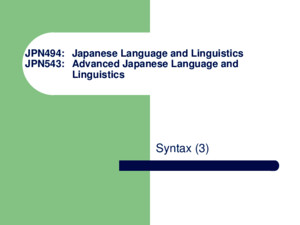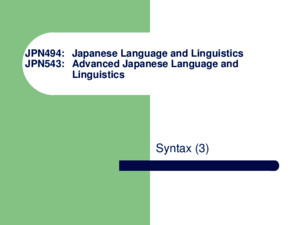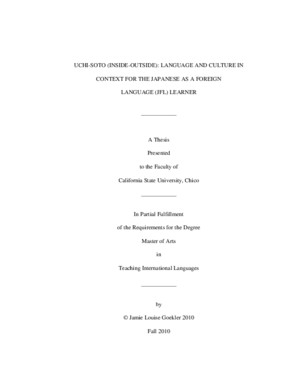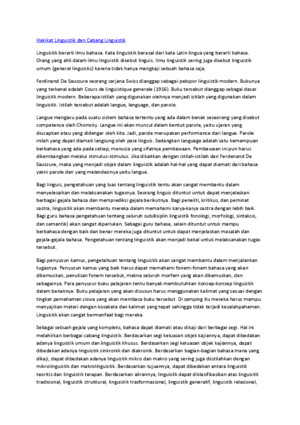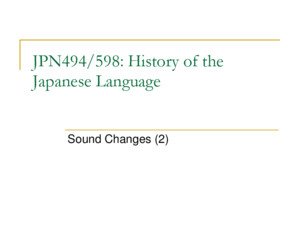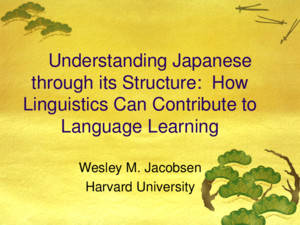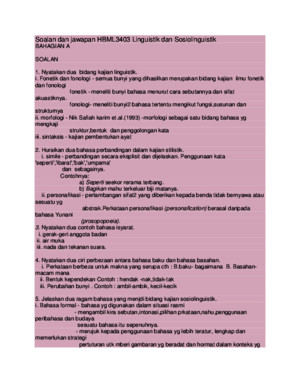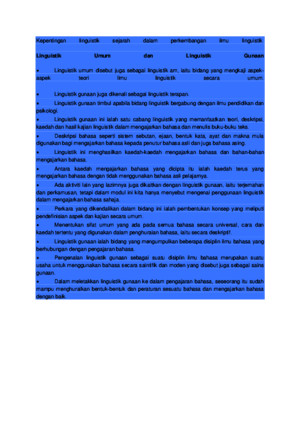JPN494: Japanese Language and Linguistics JPN543: Advanced Japanese Language and Linguistics
There is document - JPN494: Japanese Language and Linguistics JPN543: Advanced Japanese Language and Linguistics available here for reading and downloading. Use the download button below or simple online reader.
The file extension - PDF and ranks to the General category.
Tags
Related
Comments
Log in to leave a message!
Description
JPN494: Japanese Language and Linguistics JPN543: Advanced Japanese Language and Linguistics Syntax (3) Particles ( 助詞 ) 格助詞 ( かくじょし ; case particles) が , を , に , まで , から , の , … とりたて助詞 ( とりたてじょし ; paradigmatic particles) は , も , さえ , だけ , … - PowerPoint PPT Presentation
Transcripts
JPN494: Japanese Language and LinguisticsJPN543: Advanced Japanese Language and Linguistics Syntax (3) Particles (助詞) 格助詞 (かくじょし; case particles) が, を, に, まで, から, の, … とりたて助詞 (とりたてじょし; paradigmatic particles) は, も, さえ, だけ, … 並列助詞 (へいれつじょし; coordinating particles) と, や, か, … 接続助詞 (せつぞくじょし; connective particles) から, けれど, のに, … 終助詞 (しゅうじょし; sentence final particles) よ, ね, ぞ, … Case Particles 山田くんが鈴木くんに佐藤 (さとう) さんを紹介 (しょうかい) した 山田くんが鈴木くんと東京から大阪まで自転車で旅行 (りょこう) したらしい A case particle specifies the role of a nominal expression in the sentence Dependents of a predicate arguments (core participants): subject, direct object (o-marked object), indirect object (ni-marked object) adjuncts: time, location, source, goal, manner, … head vs dependent Arguments are those dependents that are selected for (required) by the predicate Predicates can be classified based on {how many arguments/what types of arguments} they select for It rainedno argument John disappearedsubject (NP) John ate an apple subject (NP) direct object (NP) John handed Mary a booksubject (NP), direct object (NP) indirect object (NP) John relied on Marysubject (NP) on-PP That John left is obvious (≈ It is obvious that John left) subject (S) John believes that John left subject (NP) complement clause (S) Adjuncts (Modifiers) are those dependents that are optional In some languages, arguments must be explicitly expressed Did you read this book? {I read it / I did} *{φ read φ / φ did} この本読んだ? 読んだ。 In languages like Japanese too, arguments can be omitted only when their identities are “contextually recoverable” (僕が/は) (その本を) 読んだ ≠ somebody read something 僕はその本を読んだ ‘I read the book’ = 僕はその本をどこかで読んだ ‘I read the book somewhere’ Case particles can be thus classified into those that mark arguments and those that mark adjuncts: argument-marking: が (nominative), を (accusative), に (dative) non-argument-marking: で, から, まで, と, に, (について,) (によって,) … 太郎は花子と結婚した。 太郎は花子に会った。 一月に、太郎は花子と(いっしょに) 北海道に行った。 “の” marks a dependent of a noun 山田さんの本 ‘Yamada’s book’ 山田さんの弟 ‘Yamada’s brother’ 山田氏の逮捕 (たいほ) ‘Mr Yamada’s arrest’ 山田氏を逮捕した ナポレオンの勝利 (しょうり) ‘Napoleon’s victory’ ナポレオンが勝利した Paradigmatic particles とりたて助詞 副助詞 (ふくじょし): ばかり, まで, など, だけ, ぐらい, … 係助詞 (けいじょし, かかりじょし): は, も, こそ, さえ, でも, しか, … 副助詞 may occur between the noun the case particle; 係助詞 may not 彼ばかりに / 彼にばかり *彼はに / 彼には とりたて助詞 make reference to the “alternatives” of the target expression 京都にも行った {奈良, 大阪, 神戸, …} 山田くんだけ来た {鈴木くん, 佐藤くん, …} うどんでも食べよう {そば, ラーメン, …} syntagmatic vs paradigmatic が/を is dropped when the NP is followed by a paradigmatic particle: 山田くん {が/は/も} 入院 (にゅういん) した 山田くん *{がは/がも} 入院 (にゅういん) した cf 山田くんだけが来た / *山田くんがだけ来た / 山田くんだけ来た 山田くん {を/は/も} 見つけた 山田くん ??{をば/をも} 見つけた cf 山田くんだけを見つけた / *山田くんをだけ見つけた / 山田くんだけ見つけた (As a rule) other particles are not dropped: 山田くん {に/??は/??も} この本を貸してあげた 山田くん {には/にも} この本を貸してあげた Expressions like only, also, even, etc are sometimes called focus particles (or focus sensitive particles) John only introduced BILL to Sue John only introduced Bill to SUE They only EAT rice (They don’t grow or sell rice) They only eat RICE (They don’t eat food other than rice) Coordinating particles Coordinating particles coordinate two nominals Eg, (exhaustive conjunction) 山田くんと鈴木くんが来るだろう (non-exhaustive conjunction) 山田くんや鈴木くんが来るだろう 山田くんやら鈴木くんやらが来るだろう (disjunction) 山田くんか鈴木くんが来るだろう Connective particles Connective particles connect two clauses: 雨が降 (ふ) ったから, 動物園 (どうぶつえん) には行かなかった 雨が降ったので, 動物園には行かなかった 雨が降ったけれど, 動物園に行った 雨が降ったのに, 動物園に行った 雨が降ったが, 動物園に行った An ending (suffix), a particle, or an ending + particle? 薬 (くすり) をのめば (nom-eba), すぐ元気 (げんき) になる 甘いものを食べれば (tabe-reba), 元気がでる 雨が降ったら, 川が増水 (ぞうすい) する 雨が降ったり, 風が吹いたりする 雨が降ると (hur-u-to), 川が増水 (ぞうすい) する Or, so-called particles are kinds of suffixes? tabe-sase-ta “Auxiliary verbs” (助動詞) according to 国語文法 (口語・文語文法) (≈ 橋本文法) “Endings” (活用語尾) according to most JSL grammars (cf 山田文法) Sentence final particles Sentence final particles convey various discourse-oriented meanings: 暑いね 暑いよ 暑いぞ 暑いな … More on case particles and paradigmatic particles が は も, さえ, でも (additive particles) だけ, しか (exclusive particles) くらい, なんか, こそ Information structure To understand the functions/meanings of は が, it is crucial to consider information structure of sentences (utterances) “Information structure”: encodes what pragmatic functions components of utterances carry whether a given component is a focus (new/important information) or not whether a given component is a topic (“what the sentence is about”) or not Focus Focus is the part of an utterance (sentence) that is: of high communicative interest / important conveys “new information” (in English) is often accompanied by the greatest phonological prominence (heaviest stress) the part that is not a focus is called background Q1: Who did you introduce to Sue? A1: I introduced BILL to Sue Q2: Who did you introduce Bill to? A2: I introduced Bill to SUE Q3: Who did you introduce to whom? A3: I introduced BILL to SUE Q4: What did you do at the party? A4: I introduced Bill to SUE “Thetic sentences” (What happened at the party?) Joe and Bob had a fight It’s raining Cleft constructions / Pseudo-cleft constructions It’s Bill [that I introduced _ to Sue] [Who I introduced _ to Sue] is Bill John only introduced BILL to Sue John only introduced Bill to SUE Joe gave ME the tickets by mistake Joe gave me the TICKETS by mistake “Dogs must be carried” (a sign in a subway station) Dogs must be CARRIED If you have a dog, you must carry it DOGS must be carried You must have a dog and carry it cf Shoes must be worn Focus-marking in Japanese 山田くんはどこでうどんを食べましたか? 山田くんは大阪でうどんを食べました。 (山田くんがうどんを食べたのは、大阪 (で) です。) 山田くんは大阪で何を食べましたか? 山田くんは大阪でうどんを食べました。 (山田くんが大阪で食べたのは、うどんです。) pitch movements within the focus phrase are emphasized (optional) pitch movements within the phrases following the focus phrase are suppressed (obligatory) pitch movements within the phrases preceding the focus phrase are suppressed (optional) there is a rise at the end of the focus phrase (optional) cf(non-phonological: leave out the background) Topic Topic: (the part of the sentence/utterance that refers to) what the sentence is about In other words: X is a topic of sentence Y iff Y is relevant to and increases the hearer’s knowledge of (the referent of) X As for Joe, Mary didn’t really love him That new Mazda, I’d like to test-drive it The film clips you’re going to see tonight, no one’s ever seen before Typically, the topic = the subject Napoleon conquered Egypt Egypt was conquered by Napoleon Typically, a topic does not convey new information Tripartite or orthogonal? topic vs comment (theme vs rheme) focus vs background Can an expression be both a topic a focus? It is Joe that Mary really loves Topic-marking in Japanese “は” is said to be a (sentence-)topic marker (rather than a subject marker) 山田くんは大阪 (おおさか) でうどんを食べました。 (Where are the kids?) 子供たちは、カレーをつくっています。 (Is the curry ready?)カレーは、子供たちがつくっています。 (What’s going on in the courtyard?) 庭では、 子供たちがカレーをつくっています。 子供たちは、庭でカレーをつくっています。 カレーは、庭で子供たちがつくっています。 庭では、 子供たちがカレーをつくっています。 子供たちが庭でカレーをつくっています。 この店は [カレーがおいしい] この店のカレーがおいしい 象は [鼻が長い] 象の鼻が長い この鳥は、[山田博士 (はかせ) が生態 (せいたい; ecology) を調 (しら) べた] 山田博士がこの鳥の生態を調べた [シーザーを殺した]のは、ブルータスだ。 ブルータスがシーザーを殺した。 [花が咲く (さく; bloom)]のは、七月ごろだ。 七月ごろ、花が咲く。 Solecismic wa-constructions 魚は鯛 (たい) がいい。 このにおいは、ガスがもれているよ。 お問 (と) い合 (あ) わせは、営業部 (えいぎょうぶ; the sales division) までお問い合わせください。 新聞 (しんぶん) は小銭 (こぜに) をご用意 (ようい) ください。 What serves as a topic? A subject tends to be a topic; so does a ni-marked NP of the “~に~がある” construction: 私はアリゾナで生まれました。 日本には、温泉 (おんせん) がたくさんあります。 It is common for a temporal/locational modifier to be a topic: ヨーロッパではベジタリアンが急増 (きゅうぞう) している。 昨日はメッツがカージナルスに快勝 (かいしょう) した。 It is relatively rare for an object or a manner modifier to be a topic: この本は、お父さんがくれた。 ビデオデッキは、ソニーが最初 (さいしょ) に製造 (せいぞう) した。 山田さんには、ワインをあげた。 ?この車では、カリフォルニアまでドライブした。 Is wa really a topic-marker? A: 「納豆 (なっとう) が嫌 (きら) いな人って多いよね」 B: 「僕は好きですけどね」 A: 「タバコを吸う女の人って増 (ふ) えてるのかな?」 B: 「ヨーロッパでは増えてるみたいですよ」 Negation and wa Wa in a negated sentence does not necessary mark a topic: 僕は推理小説 (すいりしょうせつ) は読みません (cf ?僕は推理小説を読みません) PM: (私は) 私を中傷 (ちゅうしょう; slander) する週刊誌 (しゅうかんし; magazine) は読まない (cf ??私を中傷する週刊誌を読まない) この店ではお酒は飲めません (cf ?この店ではお酒を飲めません) (僕は) 山田くんがうそをついたとは思いません (cf ??山田くんがうそをついたと思いません) 山田くんは犯人ではない (cf ?*山田くんは犯人でない) あっ、山田くんがいない! ドアが開かない! 明日は学校には行きません ‘I won’t go to SCHOOL tomorrow’ 明日は学校に行きません ‘I won’t go to school TOMORROW’ The contrastive use of wa Wa is said to have the contrastive use besides the thematic (topic-marking) use Thematic wa marks a non-focus; contrastive wa marks a focus In other words, wa is interpreted as contrastive when it’s attached to a focus phrase A sentence can have at most one topic 子供たちはカレーはつくっています。 子供たちは、カレーはつくっているけど、ご飯は炊 (た) いていません 山田くんたち、来た? -鈴木くんは来たよ。 宿題 (しゅくだい)、どのくらいかかりそう? - 2 時間はかかりそう。 (at least 2 hours) A thematic wa cannot occur in (certain types of) subordinate clauses: 日本人の作家がこの本を書いた ‘A Japanese author wrote this book’ [この本を書いた] 日本人の作家 ‘The Japanese author who wrote this book’ この本は日本人の作家が書いた *[この本は書いた] 日本人の作家 この店のカレーはおいしい ?? [この店のカレーはおいしい] ことを, みんな知っている この店のカレーがおいしいことを, みんな知っている [この店のカレーはおいしくない] ことを, みんな知っている [山田くんは来たけど鈴木さんは来なかった] ことを, みんな知っている は vs が が typically marks a subject (that is not a topic) (Who is the culprit? -) 山田くんが犯人 (はんにん) です その本は私が書きました あ、雨が降 (ふ) っている (Can I have your name?) 私は山田です (Can I talk to Mr Yamada?) 私が山田です (= 山田は私です) Exceptional ga-marking Ga does not always mark the subject the “~二~ガ” construction 山田くんには鈴木くんの気持ちがわかる 山田くんには休暇 (きゅうか; vacation) が必要だ 山田先生には, 鈴木くんの気持ちがおわかりにならない 山田先生には, 休暇がご必要でいらっしゃる cf *鈴木くんが, 山田先生にお話しかけになった the “~ガ~ガ” construction 僕はこの車が欲しい [僕がこの車が欲しい] ことを, みんな知っている 山田くんはこの車を欲しがっている 僕はお母さんが恐い [僕がお母さんが恐い] ことを, みんな知っている 山田くんはお母さんを恐がっている 僕はジャズが好きだ [僕がジャズが好きな] ことを, みんな知っている うらやましい, 憎 (にく) い, ; 嫌いだ The “major subject” construction 象 (ぞう) が鼻 (はな) が長い 象は鼻が長い 象の鼻が長い この地方 (ちほう) が冬の気候 (きこう) が温暖 (おんだん; warm) だ この地方は冬の気候が温暖だ この地方の冬の気候が温暖だ A possible derivational process: 象 (ぞう) の鼻 (はな) が長い 象 (ぞう) が [鼻 (はな) が長い] (possessor ascension) 象 (ぞう) は [鼻 (はな) が長い] (topicalization) ?このレストランが、日本人がたくさん来る このレストラン (に) は、日本人がたくさん来る 日本人がこのレストランにたくさん来る ?この辞書 (じしょ) が、学生 (がくせい) がよく使 (つか) う この辞書は、学生がよく使う 学生がこの辞書をよく使う What is the discourse function of a “major subject”? topic/focus? “Omission” of particles In speech, particles like は, が, を, are often “dropped” 田中さん, この本読んだことある? 田中さん (は), この本 (を) 読んだこと (が) ある? あれ, 雨降ってるよ あれ, 雨 (が) 降ってるよ この時計, 止まってるよ この時計が止まってるよ この時計は止まってるよ (A: Somebody will stop by around 5) (B: Okay) … A: ただいま B: お帰り お客さんもう来てるよ お客さんがもう来てるよ お客さんはもう来てるよ The whole utterance conveys new information, but the subject is familiar to the hearer 副助詞 vs 係助詞 副助詞 (ふくじょし) : だけ, ばかり, など, くらい, まで, etc ⇒ can precede (or follow) the case particle 係助詞 (けいじょし): は, も, さえ, こそ, しか, でも, etc ⇒ cannot precede the case particle This morphological/syntactic criterion is not always clear-cut 山田くんにさえ会った vs *山田くんさえに会った 山田くんさえ反対 (はんたい) した vs *山田くんがさえ反対 した vs (?)山田くんさえが反対した There is no good semantic motivation to distinguish the two classes of とりたて助詞 (paradigmatic particles) Additive particles: も, さえ, etc Paradigmatic particles make reference to “alternatives” 山田くんも来た ‘Yamada came, too’ Yamada came (core meaning) Someone other than Yamada came (additional meaning) Assertion presupposition ‘Yamada and someone else passed the exam’ = ‘Yamada passed the exam, too’? The “additional meaning” induced by too (or も) is presupposed Yamada passed the exam, too Yamada passed the exam (assertion) Someone other than Yamada passed the exam (presupposition) Presupposition: Information that is “taken for granted” by the speaker the hearer Presupposition is a special type of entailment John kicked the table ⇒ John touched the table John has been to Kyoto ⇒ John has been to Japan John stopped smoking ⇒ John smoked in the past John knows that Bob likes beer ⇒ Bob likes beer A presupposition survives under negation John didn’t kick the table ⇒ John touched the table John has never been to Kyoto ⇒ John has been to Japan John didn’t stop smoking ⇒ John smoked in the past John doesn’t know that Bob likes beer ⇒ Bob likes beer A presupposition survives when embedded in a question Did John kick the table? ⇒ John touched the table Has John been to Kyoto? ⇒ John has been to Japan Did John stop smoking? ⇒ John smoked in the past Does John know that Bob like beer? ⇒ Bob likes beer Did Yamada pass the exam, too? ⇒ Somebody other than Yamada passed the exam cf Is it true that Yamada and someone else passed the exam? When the presupposition of a statement is not satisfied, the statement is neither true or false (or, is inappropriate/infelicitous) John stopped smoking John passed the exam, too John knows that Bob likes beer The present king of France is rich Various uses of mo #1 ‘also, too’ 山田くんも来ました {鈴木くん, 中村さん, …} 明日も学校に行きます {昨日, 今日, …} 映画 (えいが) も見たい {テレビドラマ, ニュース, スポーツ, …} (narrow scope) {買い物をする, レストランで食事をする, カラオケに行く, …} (wide scope) 映画も見たいし, 買い物もしたい 映画を見もしたいし, 買い物をしもしたい I wanna buy a new car, too {a new TV, a new house …} {save money, make donations, …} #2 ‘even’ 食欲 (しょくよく; appetite) がなくて, おかゆ (porridge) も (= さえ) 食べられない ケンには, 親にも (= さえ) 言えない秘密 (ひみつ) がある 最近 (さいきん) は小学生も (= さえ) 携帯 (けいたい) を持っている そのコンサートには, お客 (きゃく) が 1 万人 (いちまんにん) も(= ?さえ) 来たらしい ‘Even’ refers to some scale indicates unexpectedness (Speaking of Japanese food,) John even likes natto (most likely) tonkatsu < … < sushi < natto (most unlikely) John even likes natto, but he doesn’t eat sushi ??John even likes natto, but he doesn’t eat any other Japanese food John likes natto (assertion) John likes some Japanese food other than natto (ps #1) Natto is a kind of Japanese food that it is relatively unlikely for John to like (ps #2) #3 ‘any’ one + classifier + も 一人 (ひとり) も来なかった ‘No one came’ 一杯も飲まなかった ‘I didn’t drink a glass’ wh + も 何も見なかった ‘I didn’t see anything’ 誰も来なかった ‘Nobody came’ An expression that can be used only under negation is called Negative Polarity Item (NPI) I didn’t read any book (cf *I read any book) I didn’t give him a red cent He won’t even lift a finger I didn’t read any book = I didn’t read a book =/= I didn’t read all kinds of books I would read any book =/= I would read a book = I would read all kinds of books #4 ‘all, every’ ど-wh + (N, etc +) も どの料理 (りょうり) もおいしい どこも混 (こ) んでいる [… wh …]+ V (te-form) +も ‘no matter what, where, etc’ 土曜日は, どこに行っても, 混 (こ) んでいる 誰 (だれ) に聞 (き) いても, 同 (おな) じことを言った #5 ‘about, not more than’ 食費 (しょくひ) は, 一日 1000 円も (=/= さえ)かからない 3日 (みっか) もかければできる #6 surprise, admiration 君も出世 (しゅっせ) したなあ このあたりもだいぶかわったなあ Sae #1 ‘even’ 最近は, 小学生さえ(= すら, さえも, も) 携帯 (けいたい) を持っている 食欲 (しょくよく) がなくて, おかゆさえ(= すら, さえも, も) 食べられない #2 ‘(if) only’ 水さえあれば, 一週間は生き残 (のこ) れる 山田くんさえ手伝ってくれれば, 車の修理 (しゅうり) は3時間で終わるだろう 雨さえ降っていなければなあ Demo #1 ‘… or something like that’ お茶でも飲もう (cf お茶を飲もう) 顔色 (かおいろ) が悪いけど, お化けでも見たの? 風邪 (かぜ) でもひいたら, 大変 (たいへん) だ #2 ‘even X (can/cannot …)’ この問題は, 小学生でも(?さえ) できる この問題は, 大学生でも(?さえ) 解 (と) けないだろう 『サルでもわかるコンピュータの本』 (A guide to computer for dummies) Made #1 case particle 駅まで歩いた 三時まで勉強した #2 ‘let alone, in addition to’ 参加 (さんか) しただけの人まで賞品をもらった ‘Even those who just participated got a prize (let alone those who won)’ 電気 (でんき) だけでなく, 電話 (でんわ) まで止まってしまった 部屋 (へや) が明 (あか) るいと, 安い家具 (かぐ; furniture) {さえ/まで}立派 (りっぱ) に見える 高い家具と並 (なら) べると, 安い家具{?さえ/まで}立派に見える Not only A, but even B B, let alone A Exclusive particles: だけ, しか(~ない), etc 山田くんだけ (=のみ) (が) 来た 本屋では, 雑誌だけ (=のみ) (を) 買った 一冊 (いっさつ) だけ (=のみ) 買った Only Yamada passed the exam Yamada passed the exam No one other than Yamada passed the exam It is not true that Yamada passed the exam too Someone other than Yamada passed the exam It is not true that only Yamada passed the exam Yamada passed the exam (???) 山田くんしか来なかった 本屋では, 雑誌しか買わなかった 一冊しか買わなかった An instance of negative polarity item (NPI) しか indicates the speaker’s or the hearer’s expectation of ‘more’ 10人だけ来た vs 10人しか来なかった Other: など, くらい, こそ など/なんて/なんか: #1 typically used with negation 中古車 (ちゅうこしゃ; second-hand car) など欲しくない I don’t want a second-hand car It’s a matter of course that I don’t want a second-hand car インドカレーなんかつくれない 狼 (おおかみ) なんて恐 (こわ) くない お化けなんていない … but can be used with positive predicates too, when there is a negative expectation オペラなんて退屈 (たいくつ) だ 料理 (りょうり) なんて簡単 (かんたん) だ “インドカレーなんてつくれない” ‘X がつくれる’ (likely) 玉子焼き < … < シチュー < … < インドカレー (unlikely) インドカレーがつくれる Not-インドカレーがつくれる A: インドカレー、つくってくれませんか? B: インドカレーなんてつくれないよ A: 山田くんはピアノがうまいらしいですね B: 彼はピアノなんか弾けないよ #2 僕の友達は、みんないい車に乗っている。山田くんなんか、BMWに乗っている。 (extreme case) くらい (は): #1 300人くらい来た #2 皿洗い (さらあらい, dish-washing) くらいは僕がやるよ I do dishes Doing dishes is a “trivial”/“expected” thing 息子には, 大学はともかく, 高校くらいは卒業 (そつぎょう) してほしい それくらい知ってるよ 皿洗いくらいやる ‘X をやらない’ (likely) 料理 < … < 皿洗い (unlikely) 皿洗いをやらない Not-皿洗いをやらない A: 君は料理は全然できないの? B: 玉子焼きくらいはつくるよ A: 山田くんが結婚したんだって。知らなかっただろう。 B: それくらい知ってたよ 料理 {くらい/なんて} 簡単だ 料理なんて簡単だ ‘X は難しい’ (likely) …< … < 難しい (unlikely) 料理は難しい Not-料理は難しい 料理くらい簡単だ ‘Xは簡単ではない’ (likely) … < … < 料理 (unlikely) 料理は簡単ではない Not-料理は簡単ではない こそ: ゴッホ (van Gogh) こそ, 19 世紀最高 (さいこう) の画家 (がか) だ ‘van Gogh who is the greatest painter of the 20th century’ 苦 (くる) しいときこそ, 助け合い (たすけあい) の気持ち (きもち) が大切だ ‘The spirit of cooperation is most important when we are in a difficult situation’

